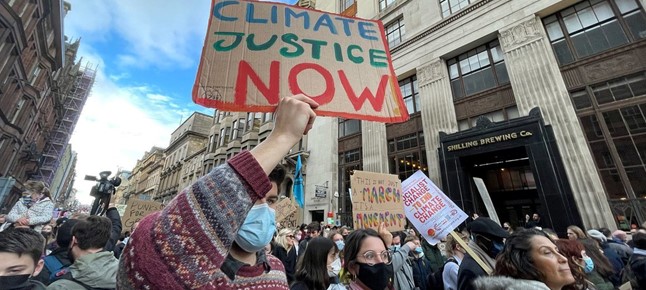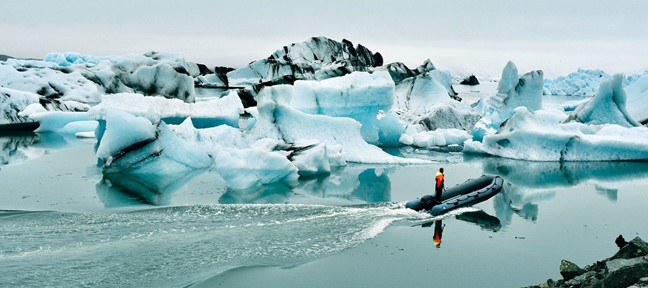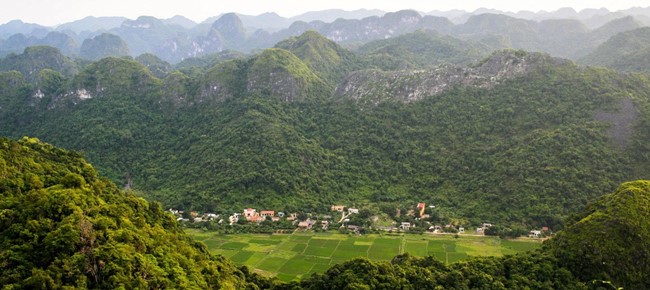UN General Assembly Adopts Landmark Resolution Recognizing a Clean, Healthy, Sustainable Environment as a Human Right

Unsplash/Toomas Tartes – Two hikers trek the mountains of Chile.
28 July 2022 – With 161 votes in favour, and eight abstentions*, the UN General Assembly adopted a historic resolution on Thursday, declaring access to a clean, healthy and sustainable environment, a universal human right.
The resolution, based on a similar text adopted last year by the Human Rights Council, calls upon States, international organisations, and business enterprises to scale up efforts to ensure a healthy environment for all.
The UN Secretary-General, António Guterres, welcomed the ‘historic’ decision and said the landmark development demonstrates that Member States can come together in the collective fight against the triple planetary crisis of climate change, biodiversity loss and pollution.
“The resolution will help reduce environmental injustices, close protection gaps and empower people, especially those that are in vulnerable situations, including environmental human rights defenders, children, youth, women and indigenous peoples”, he said in a statement released by his Spokesperson’s Office.
He added that the decision will also help States accelerate the implementation of their environmental and human rights obligations and commitments.
“The international community has given universal recognition to this right and brought us closer to making it a reality for all”, he said.
Guterres underscored that however, the adoption of the resolution ‘is only the beginning’ and urged nations to make this newly recognised right ‘a reality for everyone, everywhere’.

UN News/Laura Quiñones
Young climate activists take part in demonstrations at the COP26 Climate Conference in Glasgow, Scotland.
Urgent action needed
In a statement, UN High Commissioner for Human Rights Michelle Bachelet also hailed the Assembly’s decision and echoed the Secretary-General’s call for urgent action to implement it.
“Today is a historic moment, but simply affirming our right to a healthy environment is not enough. The General Assembly resolution is very clear: States must implement their international commitments and scale up their efforts to realize it. We will all suffer much worse effects from environmental crises, if we do not work together to collectively avert them now,” she said.
Ms. Bachelet explained that environmental action based on human rights obligations provides vital guardrails for economic policies and business models.
“It emphasizes the underpinning of legal obligations to act, rather than simply of discretionary policy. It is also more effective, legitimate and sustainable,” she added.
A resolution for the whole planet
The text, originally presented by Costa Rica, the Maldives, Morocco, Slovenia and Switzerland last June, and now co-sponsored by over 100 countries, notes that the right to a healthy environment is related to existing international law and affirms that its promotion requires the full implementation of multilateral environmental agreements.
It also recognises that the impact of climate change, the unsustainable management and use of natural resources, the pollution of air, land and water, the unsound management of chemicals and waste, and the resulting loss in biodiversity interfere with the enjoyment of this right – and that environmental damage has negative implications, both direct and indirect, for the effective enjoyment of all human rights.
According to the UN Special Rapporteur on Human Rights and the Environment, Mr. David Boyd, the Assembly’s decision will change the very nature of international human rights law.
“Governments have made promises to clean up the environment and address the climate emergency for decades but having a right to a healthy environment changes people’s perspective from ‘begging’ to demanding governments to act”, he recently told UN News.

UN News/Laura Quiñones
The Jökulsárlón Glacier Lagoon in Iceland is formed naturally from melted glacial water and is perpetually growing while big blocks of ice crumble from a shrinking glacier.
A victory five decades in the making
In 1972, the United Nations Conference on the Environment in Stockholm, which ended with its own historic declaration, was the first one to place environmental issues at the forefront of international concerns and marked the start of a dialogue between industrialized and developing countries on the link between economic growth, the pollution of the air, water and the ocean, and the well-being of people around the world.
UN Member States back then, declared that people have a fundamental right to “an environment of a quality that permits a life of dignity and well-being,” calling for concrete action and the recognition of this right.
Last October, after decades of work by nations at the front lines of climate change, such as the Maldives archipelago, as well as more than 1,000 civil society organisations, the Human Rights Council finally recognised this right and called for the UN General Assembly to do the same.
“From a foothold in the 1972 Stockholm Declaration, the right has been integrated into constitutions, national laws and regional agreements. Today’s decision elevates the right to where it belongs: universal recognition”, UN Environment chief, Inger Andersen, explained in a statement published this Thursday.
The recognition of the right to a healthy environment by these UN bodies, although not legally binding— meaning countries don’t have a legal obligation to comply— is expected to be a catalyst for action and to empower ordinary people to hold their governments accountable.
“So, the recognition of this right is a victory we should celebrate. My thanks to Member States and to the thousands of civil society organizations and indigenous peoples’ groups, and tens of thousands of young people who advocated relentlessly for this right. But now we must build on this victory and implement the right”, Ms. Andersen added.

CIFOR/Terry Sunderland
Restoring natural habitats can help to address climate and biodiversity crises.
Triple crisis response
As mentioned by the UN Secretary-General, the newly recognised right will be crucial to tackling the triple planetary crisis.
This refers to the three main interlinked environmental threats that humanity currently faces: climate change, pollution and biodiversity loss – all mentioned in the text of the resolution.
Each of these issues has its own causes and effects and they need to be resolved if we are to have a viable future on Earth.
The consequences of climate change are becoming increasingly apparent, through increased intensity and severity of droughts, water scarcity, wildfires, rising sea levels, flooding, melting polar ice, catastrophic storms and declining biodiversity.
Meanwhile, according to the World Health Organization (WHO), air pollution is the largest cause of disease and premature death in the world, with more than seven million people dying prematurely each year due to pollution.
Finally, the decline or disappearance of biological diversity – which includes animals, plants and ecosystems – impacts food supplies, access to clean water and life as we know it.
* States who abstained: China, Russian Federation, Belarus, Cambodia, Iran, Syria, Kyrgyzstan and Ethiopia.
……………………………………………………………
Full Text Of The Resolution
76/XXX The human right to a clean, healthy and sustainable environment
The General Assembly,
PP1 Guided by the purposes and principles of the Charter of the United Nations,
PP2 Reaffirming the Universal Declaration of Human Rights and the Vienna Declaration and Programme of Action, and recalling the Declaration on the Right to Development, the Declaration of the United Nations Conference on the Human Environment (the Stockholm Declaration), the Rio Declaration on Environment and Development, relevant international human rights treaties and noting other relevant regional human rights instruments,
PP3 Reaffirming also that all human rights are universal, indivisible, interdependent and interrelated,
PP4 Reaffirming its resolution 70/1 of 25 September 2015, entitled “Transforming our world: the 2030 Agenda for Sustainable Development”, in which it adopted a comprehensive, far-reaching and people-centred set of universal and transformative Sustainable Development Goals and targets, its commitment to working tirelessly for the full implementation of the Agenda by 2030 ensuring that no one is left behind, its recognition that eradicating poverty in all its forms and dimensions, including extreme poverty, is the greatest global challenge and an indispensable requirement for sustainable development, its commitment to achieving sustainable development in its three dimensions – economic, social and environmental – in a balanced and integrated manner,
PP5 Recalling States’ obligations and commitments under multilateral environmental instruments and agreements, including on climate change, and the outcome of the United Nations Conference on Sustainable Development, held in Rio de Janeiro, Brazil, in June 2012, and its outcome document entitled “The future we want”, which reaffirmed the principles of the Rio Declaration on Environment and Development,
PP6 Recalling also the Human Rights Council resolution 48/13 of 8 October 2021, entitled “The human right to a clean, healthy and sustainable environment”,
PP7 Recalling further all Human Rights Council resolutions on human rights and the environment, including resolutions 44/7 of July 2020, 45/17 of October 2020, 45/30 of October 2020 and 46/7 of March 2021, and relevant resolutions of the General Assembly,
PP8 Recognizing that sustainable development, in its three dimensions (social, economic and environmental), and the protection of the environment, including ecosystems, contribute to and promote human well-being and the full enjoyment of all human rights, for present and future generations,
PP9 Recognizing that, conversely, the impact of climate change, the unsustainable management and use of natural resources, the pollution of air, land and water, the unsound management of chemicals and waste, the resulting loss of biodiversity and the decline in services provided by ecosystems interfere with the enjoyment of a clean, healthy and sustainable environment and that environmental damage has negative implications, both direct and indirect, for the effective enjoyment of all human rights,
PP10 Reaffirming that international cooperation has an essential role in assisting developing countries, including highly indebted poor countries, least developed countries, landlocked developing countries, small island developing States, as well as the specific challenges faced by middle-income countries, in strengthening their human, institutional and technological capacity,
PP11 Recognizing that, while the human rights implications of environmental damage are felt by individuals and communities around the world, the consequences are felt most acutely by women and girls and those segments of the population that are already in vulnerable situations including indigenous peoples, children, older persons and persons with disabilities,
PP12 Recognizing also the importance of gender equality, gender-responsive action to address climate change and environmental degradation, the empowerment, leadership, decision-making and full, equal and meaningful participation of women and girls, and the role women play as managers, leaders and defenders of natural resources and agents of change in safeguarding the environment,
PP13 Recognizing further that environmental degradation, climate change, biodiversity loss, desertification and unsustainable development constitute some of the most pressing and serious threats to the ability of present and future generations to effectively enjoy all human rights,
PP14 Recognizing that the exercise of human rights, including the rights to seek, receive and impart information, to participate effectively in the conduct of government and public affairs and to an effective remedy, is vital to the protection of a clean, healthy and sustainable environment,
PP15 Reaffirming that States have the obligation to respect, protect and promote human rights, including in all actions undertaken to address environmental challenges, to take measures to protect the human rights of all, as recognized in different international instruments, and that additional measures should be taken for those who are particularly vulnerable to environmental degradation, noting the framework principles on human rights and the environment,
PP16 Recalling the Guiding Principles on Business and Human Rights, which underscore the responsibility of all business enterprises to respect human rights,
PP17 Affirming the importance of a clean, healthy and sustainable environment for the enjoyment of all human rights,
PP18 Taking note of all the reports of the Special Rapporteur (formerly the Independent Expert) on the issue of human rights obligations relating to the enjoyment of a safe, clean, healthy and sustainable environment,
PP19 Noting “The highest aspiration: a call to action for human rights”, which the Secretary-General presented to the Human Rights Council on 24 February 2020,
PP20 Noting also that a vast majority of States have recognized some form of the right to a clean, healthy and sustainable environment through international agreements, their national constitutions, legislation, laws or policies,
- Recognizes the right to a clean, healthy and sustainable environment as a human right;
- Notes that the right to a clean, healthy and sustainable environment is related to other rights and existing international law;
- Affirms that the promotion of the human right to a clean, healthy and sustainable environment requires the full implementation of the multilateral environmental agreements under the principles of international environmental law;
- Calls upon States, international organizations, business enterprises and other relevant stakeholders to adopt policies, to enhance international cooperation, strengthen capacity building, and continue to share good practices in order to scale up efforts to ensure a clean, healthy and sustainable environment for all.
https://press.un.org/en/2022/ga12437.doc.htm
https://news.un.org/en/story/2022/07/1123482
Извор: WUNRN – 23.08.2022


